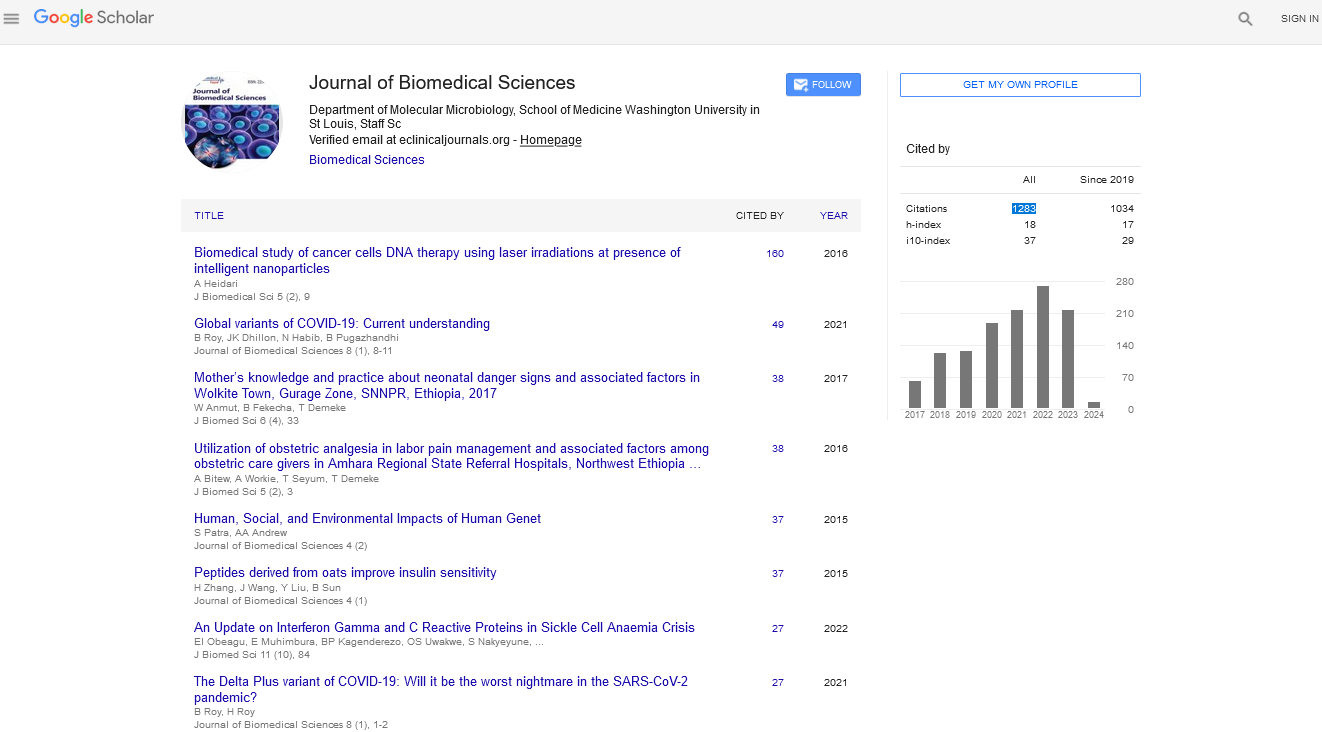Perspective - (2024) Volume 13, Issue 5
The Ethics of Genetic Testing and Personalized Medicine
Ezekiel Njeru*
Department of Biomedical Sciences and Technology, Maseno University, Kisumu, Kenya
*Correspondence:
Ezekiel Njeru, Department of Biomedical Sciences and Technology, Maseno University, Kisumu,
Kenya,
Email:
Received: 20-Sep-2024, Manuscript No. IPJBS-24-15330;
Editor assigned: 23-Sep-2024, Pre QC No. IPJBS-24-15330 (PQ);
Reviewed: 07-Oct-2024, QC No. IPJBS-24-15330;
Revised: 17-Oct-2024, Manuscript No. IPJBS-24-15330 (R);
Published:
24-Oct-2024
Introduction
Genetic testing and personalized medicine are reshaping the
landscape of modern healthcare. These advancements allow
clinicians to understand patient needs at the genetic level,
enabling more precise treatments tailored to individual genetic
profiles. Despite the significant potential for improving health
outcomes, genetic testing and personalized medicine raise
complex ethical questions. Concerns over privacy, informed
consent, accessibility, and the potential for discrimination make
this an area of ethical complexity. Addressing these issues is
crucial for ensuring that genetic testing and personalized
medicine are conducted responsibly and fairly.
Description
Introduction to genetic testing and personalized
medicine
Genetic testing involves analyzing an individual's DNA to
detect variations linked to specific diseases or health risks.
Advances in technology, such as whole genome sequencing,
have allowed for an in-depth understanding of genetic
predispositions, leading to what is commonly referred to as
personalized or precision medicine. Personalized medicine
tailor’s healthcare and treatments to a person's unique genetic
makeup, potentially leading to more effective, less harmful
interventions.
Applications of genetic testing in personalized medicine
include predicting disease risk, guiding treatment plans, and
identifying appropriate therapies based on genetic compatibility.
While this individualized approach has great promise, it also
presents ethical challenges, particularly in areas such as genetic
privacy, informed consent, and equitable access to care.
Ethical concerns in genetic testing and personalized
medicine
The ethical concerns associated with genetic testing and
personalized medicine are multidimensional, spanning privacy
issues, informed consent, discrimination, and the possibility of
unforeseen psychological impacts.
Privacy and data protection: Genetic information is highly
personal, containing data that can reveal not only an individual's
health risks but also information about family members.
Concerns arise regarding who has access to this data and how it
is stored and protected. Genetic data privacy is essential, yet
breaches or unauthorized sharing of genetic information pose
significant risks. In some cases, insurers or employers might
misuse genetic data to deny coverage or opportunities based on
genetic predispositions, an issue that raises concerns about
genetic discrimination.
Many countries have established guidelines or laws, such as
the Genetic Information Nondiscrimination Act (GINA) in the
United States, to prevent genetic discrimination. However,
regulatory protections vary globally, and issues of data
protection remain critical. Properly addressing these concerns
requires strict data handling policies, secure storage methods,
and patient consent protocols for data sharing.
Informed consent and autonomy: Informed consent is a
cornerstone of ethical medical practice, and it is particularly
important in genetic testing. Patients must fully understand the
potential outcomes and implications of testing, including how
results might impact their health, lifestyle, and family members.
However, the complexity of genetic information can make it
difficult for patients to comprehend the full scope of the testing.
This complexity raises questions about whether patients can
make fully informed choices.
Genetic counseling plays a key role in the informed consent
process, helping patients interpret results and understand the
limitations and implications of genetic testing. However, access
to genetic counseling varies, and some patients may lack
adequate support to make informed decisions. Ensuring that
patients have access to comprehensive, unbiased information is
essential for respecting their autonomy in choosing whether or
not to undergo genetic testing.
Psychological and social impacts: Receiving genetic
information about potential health risks can have profound
psychological effects. The knowledge of a genetic predisposition
to a particular disease may cause anxiety or stress, even in the
absence of actual disease. For example, knowing that one has a
higher risk of developing Alzheimer’s disease or certain types of
cancer may impact mental health, relationships, and quality of
life.
Additionally, genetic information may carry social
implications, influencing how individuals are perceived or
treated by others. These social impacts highlight the need for
sensitive handling of genetic information and careful
communication of risk, particularly when the results have a
strong likelihood of impacting the individual’s life decisions.
Ethical issues in personalized medicine
Personalized medicine builds on genetic testing by
customizing treatment to an individual’s genetic profile, offering
the potential for more effective therapies with fewer side
effects. However, the customization of treatment raises ethical
questions regarding fairness, accessibility, and transparency.
Access and equity: Personalized medicine is often associated
with high costs, making access an ethical concern. People from
lower-income backgrounds or regions with limited healthcare
infrastructure may lack access to personalized treatments,
resulting in health disparities. Equity in healthcare access is a
core ethical issue, and ensuring that personalized medicine
benefits a broad spectrum of the population is critical for social
justice.
Policies to reduce the cost of genetic testing and promote
equitable access to personalized treatments, regardless of
socioeconomic status, are essential. In addition, healthcare
providers should work to avoid a two-tiered system where only
affluent individuals have access to advanced, personalized care.
Conclusion
Genetic testing and personalized medicine represent a new
frontier in healthcare, promising more tailored and effective
treatments. However, the ethical challenges associated with
these advances require careful consideration. By addressing
issues related to privacy, informed consent, accessibility, and
transparency, healthcare providers and policymakers can foster a
responsible approach that respects individual rights and
promotes equitable healthcare. As the field progresses, a
commitment to ethical principles will be essential for realizing
the full potential of genetic testing and personalized medicine
while safeguarding the well-being of patients and society.
Citation: Njeru E (2024) The Ethics of Genetic Testing and Personalized Medicine. J Biomed Sci Vol:13 No:5





